One of Ang Lee’s finest films (after ‘Crouching Tiger, Hidden Dragon’ (2000)), ‘Life of Pi’ (2012) received wide acclaim due to its mastery of storytelling and its wonderful use of 3-D effects which made the movie a truly, visually spectacular experience. With its use of some truly beautiful cinematography and wonderful storytelling we’re transported into the world of Pi Patel and his miraculous story of being hit by a tragic shipwreck and surviving the Pacific Ocean along with one of the earth’s fiercest creatures – The Royal Bengal Tiger in his 227-day journey before being rescued. Based on the novel of the same by author Yann Martel, the movie does justice to the book by re-telling a compelling story. Nominated for eleven Oscars, Life of Pi was a landmark cinema.
We already established that Life of Pi is an achievement in visual storytelling. But there remains one aspect of the film that needs detail discussion: its ending. That’s why this article. While there have been several theories about what the ending of the film meant, I wanted to offer my take on it. So, without further ado, let’s dive in.
The Premise
Pi Patel (Irrfan Khan), an Indian immigrant from Pondicherry who’s now living in Montreal, Canada is approached by novelist Yann Martel (Rafe Spall) who comes to visit him on the recommendation of Pi’s Uncle who assured him that Pi’s life story would truly make a great book. Pi agrees to tell him his life story.
Pi’s upbringing:
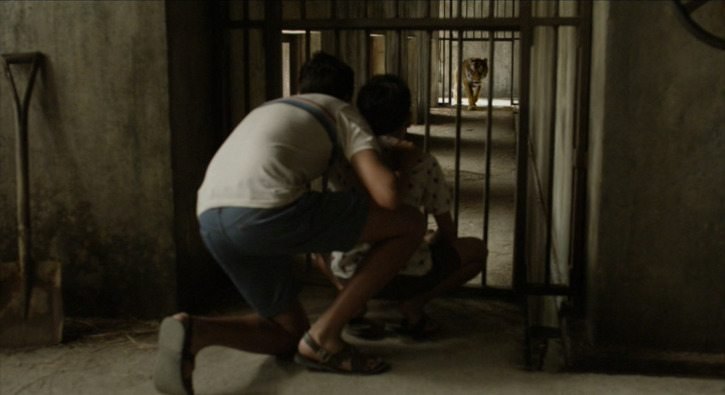
The movie introduces us to Pi whose father Santosh Patel (Adil Hussain) names him ‘Piscine Molitor’ after a famous swimming pool in France on the recommendation of his Uncle who adored swimming in that pool. Unfortunately, the poor kid is subjected to a lot of teasing by his classmates who call him “Pissing Patel”. Fed up with being taunted continuously, Piscine one day changes his name to ‘Pi Patel’, a sound-alike nickname after the Greek mathematical symbol. His parents Santosh Patel and Gita Patel (Tabu) own a zoo to which Pi takes an interest, especially with a Bengal tiger named Richard Parker. One day, Pi tries to free the tiger without letting his father know by feeding the tiger meat and thereby endangering his life. His father intervenes and angrily scolds him by saying that the Tiger is a wild animal and is not be taken as a friend. He proves his point by teaching Pi a valuable lesson by forcing him to witness the tiger killing a goat.
Pi is raised to be a vegetarian in a Hindu family but at the age of 12, is drawn into other religions like Christianity and Islam and decides to follow all three religions as he “just wants to love God”. But his father warns him that Pi needs to take a secular outlook when it comes to religion.
Stranded on the lifeboat
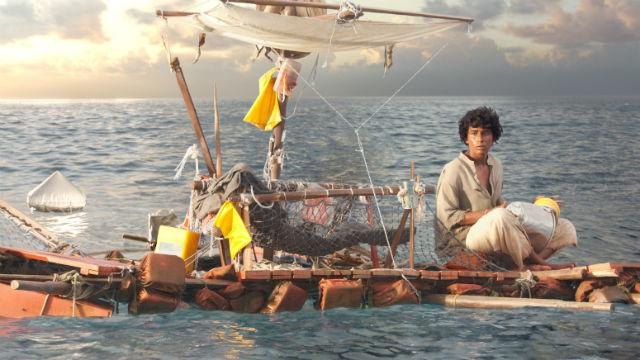
Pi, now aged 16 (Suraj Sharma) is a little upset after he learns that his father decides to close the zoo and sell them in Canada where they will be migrating, as that requires bidding farewell to his newly-met girlfriend Anandi. The Patel family books a passage with their animals aboard a Japanese freighter named Tsimtsum. One the ship, his father gets into an argument with the ship’s cook (Gerard Depardieu) when he speaks rudely with Pi’s mother. One night, the ship encounters a heavy storm over the Mariana Trench in the Pacific Ocean as a result of which the boat begins to sink while Pi is marvelling at the storm on the deck. On realizing that the ship is sinking, Pi tries to search his family, but a crew member throws him onto a lifeboat where he watches helplessly as the ship sinks, killing his family and its crew.
After the storm has subsided, Pi wakes up finding a zebra and a resourceful orangutan aboard the lifeboat. Suddenly, a spotted hyena emerges from the tarp covering half of the lifeboat and snaps at Pi, forcing him to retreat to the other side of the lifeboat. The hyena kills the zebra and later to Pi’s dismay, also mortally wounds the orangutan in a fight before Richard Parker suddenly emerges from the tarp and kills and eats the hyena, much to Pi’s relief.
Over the next few days, Pi learns to adjust life on the lifeboat by finding emergency food and water rations and building a small tethered raft from the flotation vests to maintain a safe distance from the tiger. He realizes that he needs to feed the tiger or else he’ll end up being the tiger’s dinner. He does this by learning how to fish to feed Richard Parker and him as well despite his moral code for being a vegetarian. Pi also develops a sentimentality for the tiger by helping him back onto the boat after the tiger had jumped into the ocean for hunting some fish and was on the verge of drowning.
One night, a humpback whale breaches near the boat, causing Pi to lose his supplies and his getting his raft destroyed. Pi soon learns to gain Richard Parker’s acceptance for him being on the boat and realizes that caring for the tiger is also keeping himself alive.
The Mysterious Floating Island
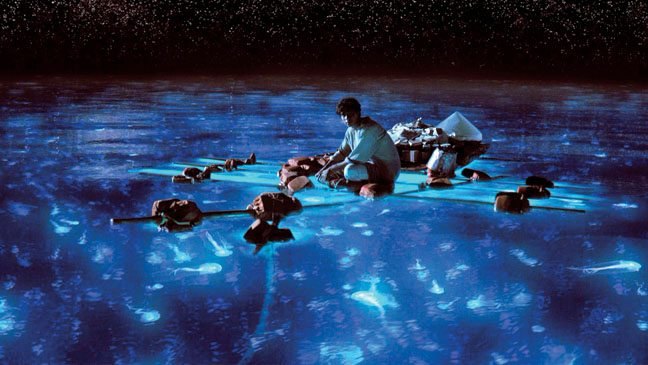
After several weeks and nearly at the end of the strength, Pi and Richard Parker reach a floating island of edible plants and interconnected trees. It is a lush jungle full of freshwater pools and has a large population of meerkats which works to both their advantage as they use this opportunity to eat and drink freely, thereby regaining their strength. But to Pi’s surprise, the island turns into a hostile environment at night as he notices that the water pools turn acidic, thereby digesting all the fish in it while Richard Parker notices the imminent danger and returns to the boat. Pi discovers a human tooth inside a plant flower and realizes that the plant is carnivorous and that if he doesn’t leave the island, his tooth will also end up in that flower. He and Richard Parker leave the next day.
Finally being rescued
After 227 days from the night of that unfortunate shipwreck, Pi’s lifeboat finally reaches the coast of Mexico. Pi while at the end of his strength is made to watch Richard Parker who disappears into the jungle without even acknowledging him. Soon, he is rescued by a group who carry him to the hospital, but Pi is still mourning over the fact that Richard Parker had abandoned him thus proving what his father had told him years ago: ‘That tiger is not your friend”. Even though he builds a relationship of friendship and trust with the tiger, Richard Parker reciprocates by just walking away without turning back to also look at him. Pi has to come terms with the fact that Richard Parker is a wild animal, not a dog and unlike Pi, the tiger doesn’t build any sentimentality towards him.
Later, he is visited by some insurance agents for the Japanese freighter who have come to hear his account of the incident but do not find his story unbelievable and asks him to tell them what “really” happened, for the sake of the credibility of their report. Pi tells them a different story by giving them a less fantastic but detailed account of sharing the lifeboat with his mother, a sailor with a broken leg and the cook. In this story, the cook kills the sailor to use him as bait and food. In a struggle with the cook, Pi’s mother pushes Pi to safety on a smaller raft while the cook stabs her. Later, Pi out of revenge returns to grab the knife and kills the cook. The Insurance agents leave, feeling dissatisfied with his story.
The Ending
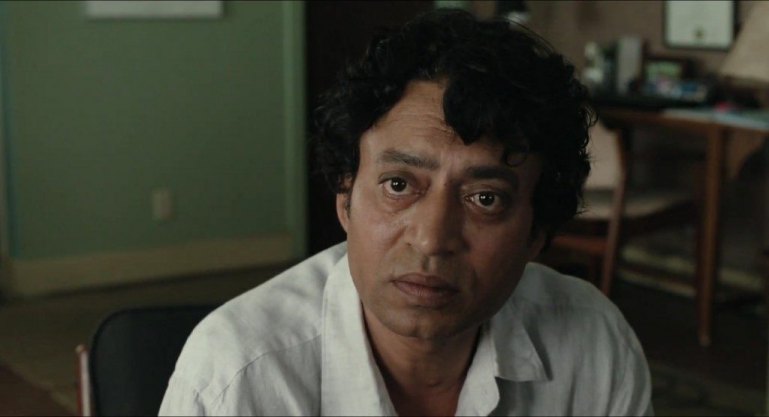
In the present, Pi ends his story. The writer notes parallels between the two stories and deduces that the orangutan is Pi’s mother, the zebra was the sailor, the hyena is the evil cook and that Richard Parker is none other than Pi himself. Pi then asks him which story the writer prefers. The writer replies, “The one with the tiger. I think that’s the better story” to which Pi responds, “And so it is with God”. Pi remarks that his story does have a happy ending when he introduces him to his family: a wife and two young boys. The writer glances at a copy of the insurance report about Pi’s remarkable feat of surviving 227 days at sea, especially with a Royal Bengal Tiger. This indicates that the agents chose to go with that story as well.
Yes, the story narrated by Pi is quite confusing and may even sound unbelievable to many viewers. It’s possible that Pi’s survival extends to an unprecedented 227 days and that he hones his surviving skills like training a tiger and being forced to eat raw fish. There’s also a lot of doubt over the fact that he even discovered a carnivorous island made entirely of seaweed which no one has ever heard of. Which is why the Japanese investigators are right there with you. Also, they tell Pi quite flatly, “We don’t believe your story”.
After given another chance to explain what really happened, Pi links his storytelling with faith. He talks about how our understanding of the world shapes the facts we share about it. He explains the danger of reason on its own. And he expresses disappointment in the investigator’s expectations as he believes they want a story they already know. On a theoretical level, Pi defends himself well. But the twist in the tail happens when he tells an alternative version of his story where he retells the shipwreck, his survival and his 227 days at sea but excludes the part regarding the animals. In their place, he narrates a horrific story where he puts himself, a Japanese sailor, Pi’s mother and that horrid cook.
Yes, the film’s juxtaposition of the animal story and the human story has led many viewers to see the last-minute plot point as a finite twist, which indeed was not mentioned in Martel’s book. While Pi narrates his human story to the Japanese investigators, you can notice the look of anguish on Pi’s face which truly indicates why he was really uncomfortable while facing the real horrors of his experience. The viewer can definitely sympathise with Pi as we’re made to witness how he watches in horror, as the ship sinks, killing his entire family. He isn’t even given any time to mourn for them as the next thing you know, he witnesses rather helplessly as the hyena being in its true nature, kills both the zebra and the orangutan and how he’s made to watch the tiger’s wrath as it plunges on the hyena, killing and devouring it. Pi feels guilty overexpressing delight over the hyena’s death, as if he committed the crime himself, out of revenge. He’s witnessed so much gruesome death in just a span of a few hours and now realizes that he, being the only castaway on the massive Pacific ocean and faced with complete seclusion, has to learn not only how to survive but also to keep the tiger’s stomach full or else he will end up being devoured by Richard Parker himself.
Final Word
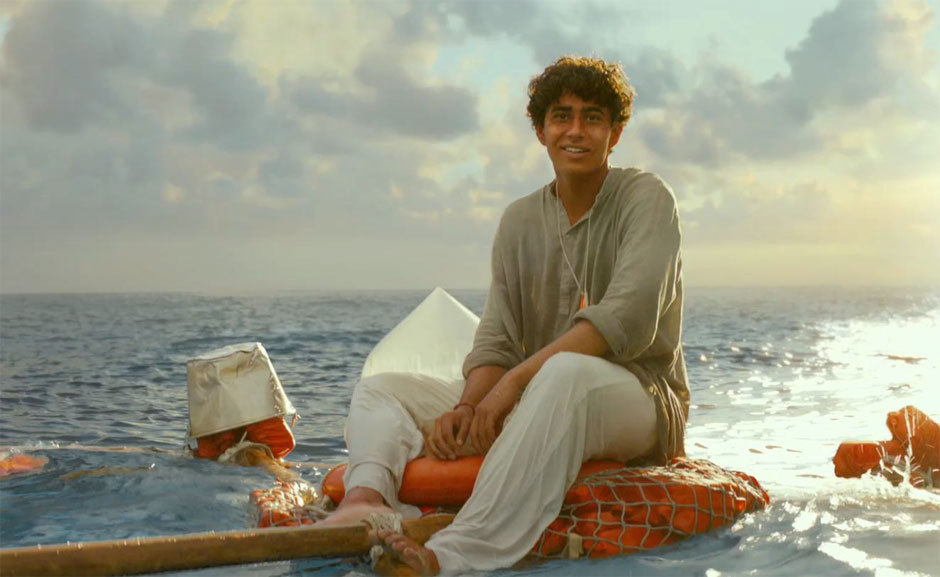
So, in the end, there seems to be no “correct answer” after all and that the filmmakers intentionally leaves the question unanswered so that the viewers can make up their mind. We already know that Pi’s Uncle promised the writer that he would be given a story that would make him believe in God. At the beginning of the film, we see how Pi is struggling to reconcile the differences between interpreting the different faiths like Hinduism, Christianity and Islam. He acknowledges that each one of them contained some valuable elements that together help him survive this terrible ordeal while at sea. This point is acknowledged where there is a sequence in the ocean where Pi remarks that he’s made his peace with God.
So, the larger question is quite impossible to answer definitively, and as mentioned, the “truth” of Pi’s story is of little concern to Martel or Lee for that matter. The real question that you should be asking yourselves is: Which version do you prefer? Do you think that Pi, as a young boy, comes up with a fantastical tale to cope up with an ugly truth? Or could it be that the beauty of the first story outweighs the credibility of the second story? The key thing to remember is that interpretation can be a subjective thing, but the question is intended to serve as a moment of theological reflection. To put it in more simpler terms: Are you a person that prefers to believe in things that always make sense/things that you can see? Or are you a person that prefers to believe in miracles and leave it on faith? It is more likely that a person who believes in God will choose to believe the first story, whereas a more rational minded person who questions God will also question the practicality of the first story and hence will choose to believe the second story.
Read More in Explainers: No Country For Old Men | The Great Gatsby

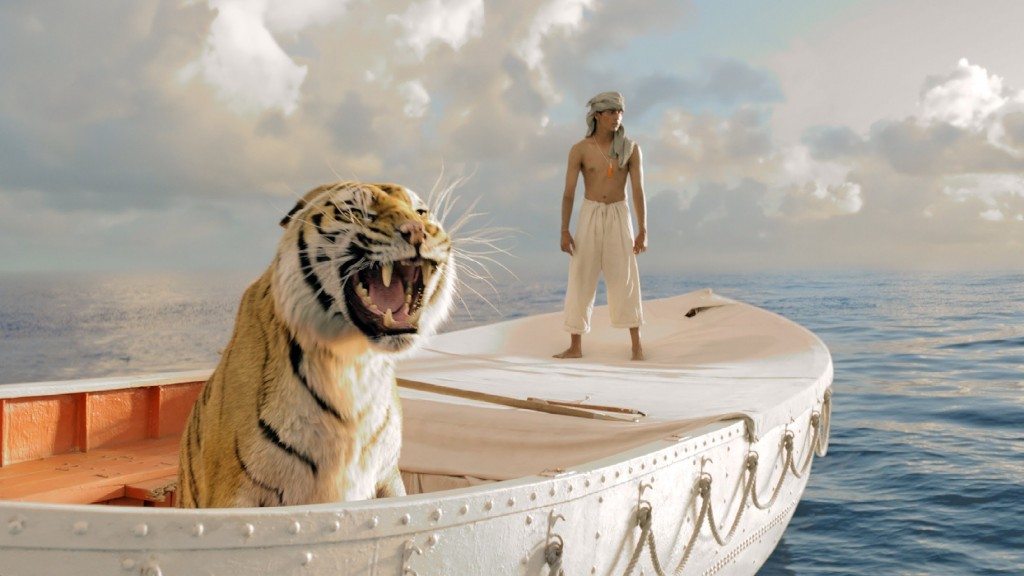
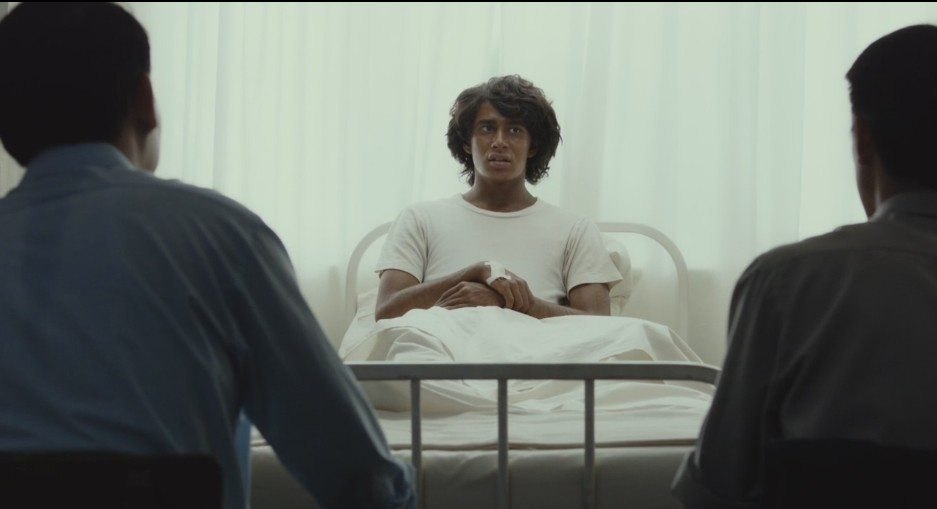
You must be logged in to post a comment.